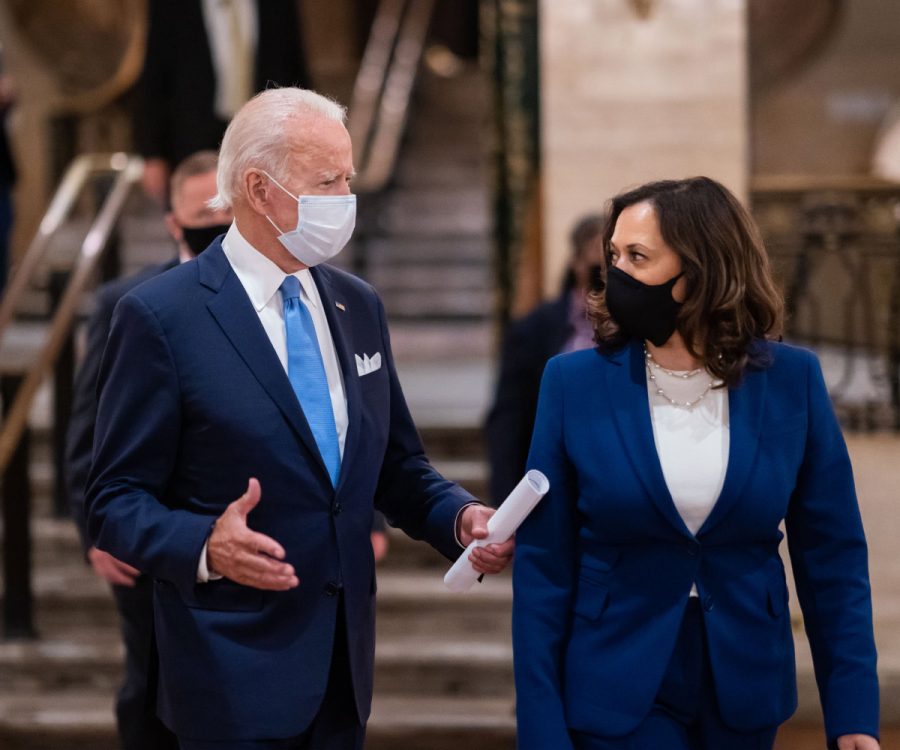First weeks in office for new administration
Photo from the White House website
President Joe Biden and Vice President Kamala Harris on their first week in office.
March 1, 2021
The transition of power is one of the most important moments in any president’s term. It’s a time when vital information is passed from the departing administration to the incoming one, and a smooth transition is key to a successful term.
After one of the most contentious election cycles in history, a complete transition of power and successful first weeks in office had to take place to regain a sense of normality. After some unforeseen circumstances, the new administration was already on the back foot going into inauguration day.
Newly-elected President Biden issued nine executive orders on day one, more than any other president in the modern era. His agenda was to repeal specific laws passed by former President Trump and reinstate membership cuts during the Trump administration. Major highlights included rejoining the Paris Climate Agreement and the World Health Organization. These orders fall in line with campaign promises made by Biden and his team to take steps to solve the climate problem, get the pandemic under control, and focus on ending discrimination.
Biden also took steps to start combating COVID-19, one of the biggest debate points on the election trail. He laid out his plan to tackle the virus which includes the expansion of testing and the rollout of vaccines to the American people. He also instituted a mask policy on all federal property and pledged to listen to science and consult health professionals on decisions regarding the virus.
“We are coming to this with a determination to meet these challenges with solutions as big as the problems are,” White House Chief of Staff Ron Klain stated in an interview with TIME. “Our goal is to rally the country behind that, mobilize the Congress behind that, start to make the changes we need to make to tackle these horrible problems.”
Other highlights coming out of the Oval Office during the first week included Biden’s reversal of Trump’s ban on transgender people in the military, an order to the Department of Justice to end contracts with private prisons and the building of the Keystone Pipeline.
“We’re going to combat climate change in a way we have not before,” Biden said while signing executive orders on Jan. 25. “They are just executive actions. They are important, but we’re going to need legislation for a lot of the things we’re going to do.”
Some promises have yet to be fulfilled by the President. Most notably, Biden failed to eliminate both the tax cuts for the wealthy passed by Trump and to pass any gun violence reform including increased background checks like he promised to do in his first week.
Biden’s administration still has much bigger plans leading up to the 100th day in office. Most ideas focused on COVID-19 vaccination and economic relief.
By April the administration hopes to have 100 million people fully vaccinated and safely reopen middle and elementary schools across the country. The success of the vaccination effort and Biden’s proposed $1.9 trillion COVID-19 relief bill which passed through Congress on Friday, opening the way for the next phase in the rescue plan.
Another big talking point on the campaign trail was the ongoing issue of racial inequality in America. To combat this issue, the Biden administration is working to allocate funding and resources to aid underfunded minority communities hit hard by the pandemic and also improve community services in those areas.
Biden has worked to make his own team more racially and culturally diverse as well. His cabinet, one of the most diverse in history, is expected to pass legislation to help previously underrepresented communities of color and indigenous communities. Some notable firsts in Biden’s cabinet include Deb Haaland, the first Native American secretary of the interior, and General Lloyd Austin, the first Black Secretary of Defense.
A very prominent refrain in Biden’s campaign was the call for unity, which found time in his first address to the nation as president on inauguration day.
“This is our historic moment of crisis. And unity is the path forward. And we must meet this moment as the United States of America,” Biden said. “If we do that, I guarantee you we will not fail. We have never, never, never, never failed in America when we acted together.”







